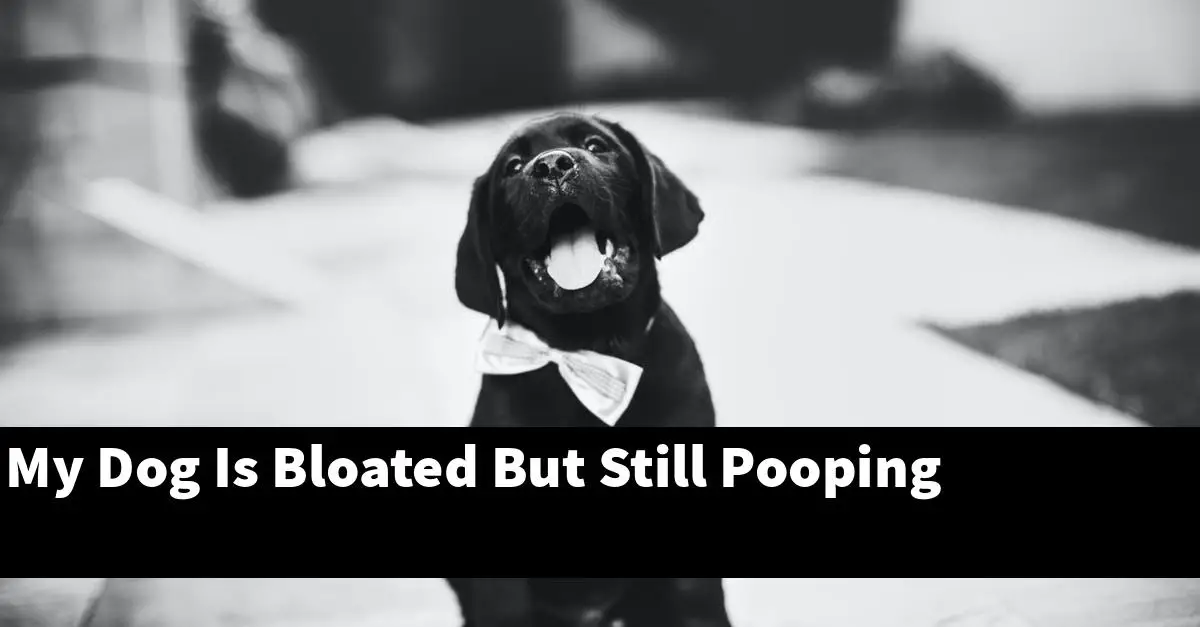Bloating in dogs can be caused by various factors, including overeating, drinking too much water too quickly, intestinal parasites, and certain types of tumors. If your dog is bloated but still pooping, it is likely due to one of the less serious causes. However, if your dog is bloated and not pooping, this could be a sign of a more serious condition and you should take them to the vet immediately.
The article will be discussing the possible causes of a dog’s bloating, despite the fact that they are still able to defecate.
Table of Contents
What are the possible causes of bloating in dogs?
There are many possible causes of bloating in dogs. The most common cause is gulping air while eating or drinking too quickly. This can happen if your dog is eating from a bowl that is too high off the ground, or if he is drinking from a hose or fountain. Other possible causes of bloating include:
-Eating or drinking too much at one time
-Exercise immediately after eating or drinking
-Eating foods that are high in fat or fiber
-Certain medical conditions such as gastric dilatation-volvulus (GDV), which is a condition that affects the stomach and can cause it to bloat.
If your dog is bloated, it is important to take him to the vet immediately as it can be a life-threatening condition.
Why is it a problem if my dog is bloated but still pooping?
Bloating in dogs can be a serious problem and if your dog is bloated and still pooping, it is important to seek veterinary attention immediately. Bloating is a medical emergency and can be life-threatening.
When a dog bloats, their stomach fills with gas, food, or fluid. This can cause the stomach to twist, which can cut off blood supply to the stomach and other organs. If not treated promptly, bloating can lead to death.
If your dog is bloated and still pooping, it is important to seek veterinary attention immediately. Bloating is a medical emergency and can be life-threatening.
What are the treatment options for a dog with bloating?
There are a few different treatment options for a dog with bloating, depending on the severity of the condition. For mild bloating, your veterinarian may recommend a change in diet, avoiding food or treats that are high in fat, and adding a gas-relieving supplement to your dog’s food. If your dog’s bloating is more severe, your veterinarian may recommend surgery to remove the excess gas and fluid from the stomach.
How can I prevent my dog from getting bloated?
There are a few things you can do to help prevent your dog from getting bloated. First, avoid feeding your dog large meals. Instead, break their food up into smaller, more frequent meals. Second, make sure they have plenty of water to drink and that they are getting moderate exercise. Lastly, avoid giving them table scraps or other high-fat foods. If you follow these tips, you should be able to help prevent your dog from getting bloated.
Do dogs with bloat have bowel movements?
Dogs with bloat may have difficulty passing bowel movements due to the build-up of gas and fluid in their stomach and intestines. Bloat can cause the stomach to twist, which can cut off the blood supply to the gastrointestinal tract and cause tissue damage. If your dog is bloated, it is important to seek veterinary care immediately.
Why does my dog’s belly look bloated?
If your dog’s belly looks bloated, it may be because he has a condition called gastric dilatation-volvulus (GDV), also known as bloat. GDV is a life-threatening condition that occurs when the stomach fills with air and twists on itself. This prevents the stomach from emptying and can cause the stomach to rupture. GDV is a medical emergency and requires immediate veterinary treatment.
Why is my dog bloated but acting fine?
There are several potential reasons why your dog may be bloated but acting fine. One possibility is that your dog has a condition called gastric dilatation volvulus (GDV), which is also known as bloat. GDV occurs when the stomach becomes distended with gas or air and then twists on itself, cutting off the blood supply. GDV is a medical emergency and can be fatal if not treated immediately.
Another possibility is that your dog has a build-up of fluid in the abdomen (known as ascites), which can be caused by various underlying health conditions. Although ascites can cause abdominal pain and discomfort, it is often not accompanied by other clinical signs, which is why your dog may appear to be acting fine.
If your dog is bloated and you are unsure of the cause, it is always best to seek veterinary advice. Your vet will be able to carry out a physical examination and may need to perform some diagnostic tests, such as x-rays or ultrasound, to reach a diagnosis.
What helps a dog with a bloated stomach?
A bloated stomach is a condition that can affect dogs of any age, size, or breed. The most common symptom of a bloated stomach is a distended abdomen, which may be accompanied by other symptoms such as vomiting, diarrhea, lethargy, and loss of appetite.
There are many possible causes of a bloated stomach in dogs, including gastrointestinal disorders, overeating, intestinal blockages, and cancer. Treatment for a bloated stomach will vary depending on the underlying cause. For example, if the cause is a gastrointestinal disorder, treatment may include dietary changes and medication. If the cause is an intestinal blockage, treatment may require surgery.
If your dog is displaying symptoms of a bloated stomach, it is important to seek veterinary care as soon as possible. A bloated stomach can be a serious condition and, if left untreated, can be fatal.
Summary
:
A dog’s bloating can be caused by various factors, including overeating, drinking too much water too quickly, intestinal parasites, and certain types of tumors. If your dog is bloated but still pooping, it is likely due to one of the less serious causes. However, if your dog is bloated and not pooping, this could be a sign of a more serious condition and you should take them to the vet immediately.


